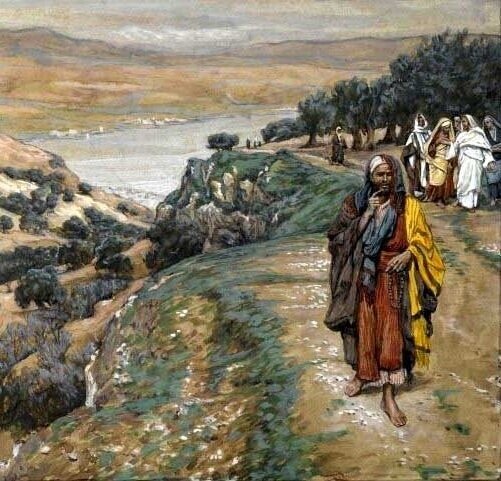Brooklyn Museum – The Rich Young Man Went Away Sorrowful – James Tissot
The following is a reflection on the Sunday Gospel for October 10, 2021.
I’m trying to work this out for myself. What’s the role of the poor in the story of the rich man in today’s Gospel? After telling Jesus he has faithfully observed the commandments from his youth, he is summoned by Jesus to sell all that he has and give to the poor. We know that he goes away sad.
My approach to this scene has usually focused on the act of dispossession that Jesus is asking of the man. In order to be sufficiently free to follow me, Jesus says, you must let go of what keeps you bound to yourself. In the context of a homily, that usually leads to asking the congregation to identify what in their lives is preventing them from more energetically taking up the path of discipleship. For the man in the Gospel, it was his possessions. For me or for you, it might be something else.
Fair enough. But the clear warning in today’s Gospel is the danger of riches. Too quickly generalizing this to include other forms of detachment runs the risk of blunting the specific point that is being made. It also runs the risk of rendering nameless and faceless the intended recipients of the man’s wealth, simply referred to as “the poor.” If the meaning of Jesus’ words refers only to the action whereby the rich man is unburdened of his possessions, then the actual encounter with the poor may well be replaced by the ancient equivalent of a drop box or the Salvation Army or a check in the mail.
This is where this is leading me. The conditions for following Jesus are not exhausted by a willingness to let go of disordered attachments. It includes also the sharing of one’s goods with those in need, an entering into solidarity with the suffering members of the human family. Once again, that is not so much the fruit of a converted life. Today’s Gospel tells us that it is the necessary condition for such a conversion to take place.
Something similar comes to light in the parable of the rich man and Lazarus. The riches are not in themselves the problem for the unnamed rich man. It’s what they have done to him, not only closing his ears to the pleading of Lazarus sitting at his gate, but closing the eyes of his heart to his very presence. It is the wonderful irony of this scene that it is the rich man who goes nameless, while the poor man is honored and individualized with a name of his own.
I began by saying I’m trying to work this out for myself. It comes down to saying that helping to bind up the wounds of the poor is not an option reserved for those so inclined. It is an essential and necessary mark of anyone who takes seriously the following of Christ. It is also the way that sadness gives way to joy.
